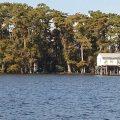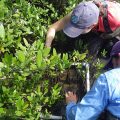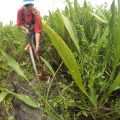Melissa M. Baustian, Ph.D. is a Coastal Ecologist with The Water Institute of the Gulf. She has more than 15 years of experience in researching the ecological responses of aquatic ecosystems to nutrient enrichment, eutrophication and hypoxia. She has extensive research experience studying the benthic ecology of the low-oxygen area, known as the “Dead Zone”, in the northern Gulf of Mexico.
Dr. Baustian's current research is focused on providing technical support in the data collection and development, and application of analyses and ecosystem models to examine nutrient-related dynamics from restoration efforts in Louisiana’s coastal zone. She is also examining climate change related effects on coastal vegetation and ecosystem processes, a research priority in the Institute’s Science and Engineering Plan. This includes a field study that examines organic matter decomposition and short-term and long-term soil carbon accumulation rates in herbaceous wetlands across a salinity gradient and determining how black mangrove expansion might alter basal carbon sources in benthic food webs of salt marshes.
In addition to being a researcher at the Institute, Dr. Baustian is the Director for the RESTORE Act Center of Excellence for Louisiana where she leads the administration of a competitive coastal research grants program. She is also adjunct faculty in the Department of Oceanography and Coastal Sciences at Louisiana State University in Baton Rouge.
Prior to joining the Institute, Dr. Baustian was a post-doctoral researcher at the Center for Water Sciences at Michigan State University in East Lansing, MI, where she collaborated with other water researchers that have a wide range of expertise (e.g. economics, microbiology, geography, geochemistry) to better understand the coupling of socioeconomic and ecological systems in the Great Lakes. While at Michigan State University, she also conducted research on the essential mechanisms and stressors involved in benthic-pelagic coupling of lakes, estuaries, and oceans.
Dr. Baustian earned a M.S. and Ph.D. from the Department of Oceanography and Coastal Sciences at Louisiana State University and a B.S. in biology at Iowa State University.

Melissa Baustian
Coastal Ecologist/Senior Research Scientist/Director of LA-COE
Projects
- Finding the right flow
- Relationships between salinity and short-term soil carbon accumulation rates from marsh types across a landscape in the Mississippi River Delta
- Impact of black mangrove expansion in coastal Louisiana
- Determining habitat function, decomposition, and carbon accumulation across four marsh habitat types in coastal Louisiana
- RESTORE Act Center of Excellence for Louisiana
- The Natural Classroom Project
- Partnership for Our Working Coast
- System-Wide Assessment and Monitoring Program (SWAMP)
Reports
Publications
- Relationships Between Salinity and Short-Term Soil Carbon Accumulation Rates from Marsh Types Across a Landscape in the Mississippi River Delta
- Linking the bottom to the top in aquatic ecosystems
- Modeling current and future freshwater inflow needs of a subtropical estuary to manage and maintain forested wetland ecological conditions
- A one hundred year review of the socioeconomic and ecological systems of Lake St. Clair, North America
- Microphytobenthos along the Louisiana continental shelf during mid-summer hypoxia
- Seasonal microphytobenthos on the hypoxic northern Gulf of Mexico continental shelf
- Effects of summer 2003 hypoxia on macrobenthos and Atlantic croaker foraging selectivity in the northern Gulf of Mexico
- Seasonal Composition of Benthic Macroinfauna Exposed to Hypoxia in the Northern Gulf of Mexico
- Response of Shrimp Populations to Land-Derived Nitrogen in Waquoit Bay, Massachusetts
- Paleo-environmental evidence of ecosystem change in Lake St. Clair region of Laurentian Great Lakes basin: contrasting responses to land-use change and invasive mussels
- Engaging coastal community members about natural and nature-based solutions to assess their ecosystem function
- Influence of the Mississippi River on Pseudo-Nitzschia spp. Abundance and Toxicity in Louisiana
- Dinoflagellate Cysts Track Eutrophication in the Northern Gulf of Mexico
- Direct and indirect controls on organic matter decomposition in four coastal wetland communities along a landscape salinity gradient
- Historical Associations of Molecular Measurements of Escherichia coli and Enterococci to Anthropogenic Activities and Climate Variables in Freshwater Sediment Cores
- Melitasphaeridium choanophorum – a living fossil dinoflagellate cyst in the Gulf of Mexico
- EnvironMentors: Mentoring At-Risk High School Students through University Partnerships
- Shifting career pathways of Ph.D. ecologists: Is it time to redefine the "alternative" career?"
- Coupling Socioeconomic and Lake Systems for Sustainability: A Conceptual Analysis Using Lake St. Clair Region as a Case Study
- A Bayesian hierarchical modeling approach for analyzing observational data from marine ecological studies
- Innovative Assessment Tools for a Short, Fast-Paced, Summer Field Course
- Development of an Integrated Biophysical Model to represent morphological and ecological processes in a changing deltaic and coastal ecosystem
- Knowledge-Based Predictive Tools to Assess Effectiveness of Natural and Nature-Based Solutions for Coastal Restoration and Protection Planning
- Elevating local knowledge through participatory modeling: active community engagement in restoration planning in coastal Louisiana
- Monitoring plans for Louisiana’s system-wide assessment and monitoring program (SWAMP). Version IV
See All Work


